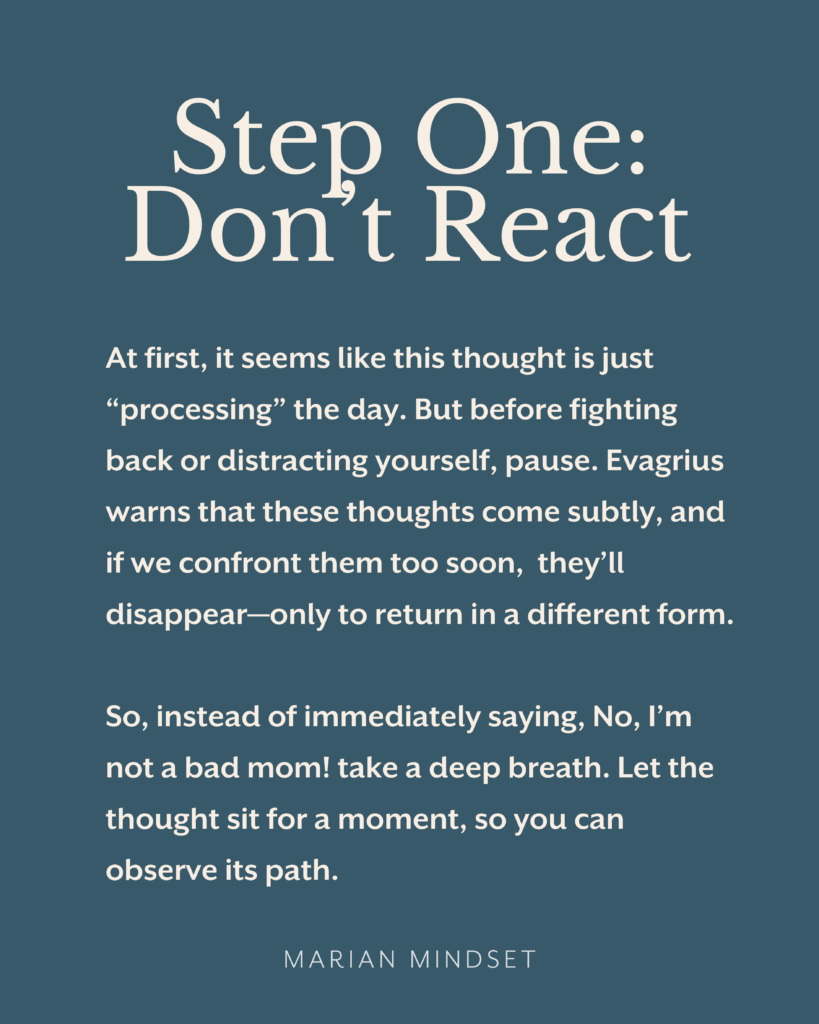Evagrius Ponticus, aside from having an awesome-sounding name, was one of the most influential ascetics to come out of the deserts.
He was born in what is now modern-day Turkey and was well-educated in Greek philosophy and Christian theology. But he left that life (and a promising career) to enter the Egyptian desert.
He’s most known for his sophisticated understanding of how thoughts shape the soul, categorizing eight evil thoughts (logismoi)—the foundation for what later became the Seven Deadly Sins.
His writings were controversial—some were later condemned due to alleged Origenist influences* (if you’re not sure what this is, we have a brief recap at the end of this blog), but his insights on spiritual warfare and the mind remain widely respected. And incredibly, Evagrius put into words many things that psychology wouldn’t have the language for until centuries later.
So, let’s first look at thoughts as the Bible describes them, what Evagrius says about them AND then what we know thanks to modern science and psychology.
Not surprisingly, scripture has a lot to say about our thoughts and the role they play in our lives. If you remember from last week, the early Church considered the heart to be both our mind, heart, and will altogether. Here is just a sampling of what Scripture says:

Evagrius took these scriptures and ran with them. He believed that all our actions, as the Psalmist says, stem from our thoughts.
And if we wish to live holy lives, we must, “keep careful watch over his thoughts. Let him observe their intensity, their periods of decline, and follow them as they rise and fall. Let him note well the complexity of his thoughts, their periodicity, the demons which cause them, with the order of their succession and the nature of their associations. Then let him ask from Christ the explanations of these data he has observed.” (Evagrius Ponticus, Praktikos, 50)
Yes, he did just say “demons which cause them” and we’ll get to that in just a minute. But we can see that Evagrius doesn’t just want us to notice the thoughts we have but really pay attention to them, observing their patterns, their triggers, and their effects on our emotions and actions.
What Evagrius recognized—centuries before modern psychology—was that unchecked thoughts shape emotions, which in turn shape actions. Fast forward to the 1960s, and Dr. Aaron Beck, a psychiatrist, made a strikingly similar discovery while treating patients with depression.
Beck discovered that patients with depression often had automatic negative thoughts—uninvited, intrusive beliefs that shaped their emotions and actions. Left unchecked, these thoughts created a self-reinforcing cycle of despair.
To combat this, he developed Cognitive Behavioral Therapy (CBT)—a method for identifying distorted thoughts, challenging and replacing them, and reshaping emotional well-being through consistent mental discipline.
But, again, Evagrius coulda told him that… 1,500 years before.
So, what does all that mean for us?
As easy as it is to believe everything that pops into our minds is true, we are called to be vigilant and guard our thoughts closely.
Because moms and spiritual mothers have plenty of thoughts we feel are true:
- “I am failing at this.”
- “I am ruining my kids?”
- “I should have it all together by now.”
- “Everyone else seems to be doing a better job than I am.”
- “I don’t have what it takes.”
- “This is too much.”
- “I am not where I should be in life.”
But are these thoughts actually true?
And we mean THE TRUTH, not what Instagram tells us is reality. If we hold these statements up to the light of the Gospel, do they shine or burn up and float away as ashes on the wind?
In this post, we’re going to examine three ways Evagrius says that thoughts frequently get the better of us and what it means for our motherhood.
But first, let’s talk about that whole demon thing.
That Whole Demon Thing
Throughout his works, Evagrius frequently referred to demons in his writings. Like, every two pages.
He saw spiritual warfare as a battle of the mind with demons not necessarily being about external, visible monsters attacking people, but spiritual forces influencing thoughts and creating temptation.
So, what does that mean? Every time we have a bad thought, it’s a demon? The Church does not have a specific teaching on which exact thoughts can be attributed to demons and which ones are a result of having a sinful human nature. But many saints have written on this subject. Most notably, Ignatius of Loyola in his Spiritual Exercises.
But here is what we can say with certainty:
#1: The Church strongly affirms that humans have free will and can choose good or evil. (CCC 1731-1732)
#2: The Church teaches that angels and demons are real beings who influence human lives .(CCC 391-395) While the Catechism does not state that demons plant thoughts, Catholic tradition—especially the writings of Aquinas, Augustine, and Ignatius of Loyola—suggests that they can influence our minds through temptation, deception, and emotional manipulation, that is, manipulating our thinking to produce dark or hopeless feelings.
Ultimately, when you see or hear Evagrius referring to the “demon of wandering” or the “demon of sadness,” it’s not a suggestion that anyone who is sad is possessed.
Human nature, in its fallen state, is capable of producing negative thoughts all on its own. However, the very fact that negative thoughts exist at all—whether sadness, despair, fear, or temptation—can ultimately be traced back to the reality of sin and the fallen world.
But we can learn something interesting about how Satan and his kin work. To explore this, let’s look at Jesus’ temptation in the desert.

How Satan studies and strategizes against us
When Jesus enters the desert for 40 days after His baptism to pray, fast, and be tempted, it’s not because Jesus needs refinement.
He is God. Satan cannot offer Jesus anything He doesn’t already have. So when Jesus goes to be tempted, it is because He knows we will face temptation and need Him to show us what to do.
So, why would Satan even bother trying to tempt the God-Man? Seems kinda futile, even for one as prideful as the accuser.
Doctor of the Church, St Thomas Aquinas suggests something interesting. In his Summa Theologica, Aquinas suggests that the devil wasn’t entirely sure if Jesus was the Messiah.
Aquinas explains that Satan and his demons had been watching Jesus—closely studying His works—but they still weren’t certain. That’s perhaps one of the reasons why the devil says, “If you are the Son of God…” (Matthew 4:3, 6). To get Jesus to prove He is God.
Aquinas goes on to quote St Augustine who observed that the demons only knew as much about Christ as He allowed them to know. They didn’t recognize Him as the Giver of Eternal Life but only as someone who had power over earthly things. From what they saw, they could guess He might be the Son of God, but they weren’t completely sure (Aquinas, ST III, Q.41, A.1).
This detail tells us something crucial (and a little chilling): our adversaries are paying attention. They are highly intelligent, and they are observing our every move.
In fact, many Church Fathers suggest that just as we have guardian angels guiding us, Satan and his demons are also keeping watch over us individually. Their vigilance is one of strategy—they are taking notes, learning our weaknesses, and crafting temptations designed just for us.
St. Gregory the Great, in his Moralia in Job, vividly describes how the devil diligently studies his target before striking. Using the example of Job, Gregory compares Satan’s tactics to an army besieging a city:

Gregory’s insight here is huge: this is how spiritual warfare works. The devil studies our patterns and attacks strategically.
If external hardships don’t shake us, he moves inward—whispering doubts into our minds, distorting the words of those we love, and using our own thoughts against us. He is always taking notes, watching for our weaknesses, and adapting his tactics accordingly.
This is why guarding our minds is critical. Scripture repeatedly warns us to take our thoughts captive (2 Corinthians 10:5), to be sober and vigilant because our adversary is always on the prowl (1 Peter 5:8), and to put on the full armor of God—including the helmet of salvation, which protects our minds (Ephesians 6:10-18).
But how do we do this?
Jesus shows us the way during His temptation and Evagrius Ponticus gives us a framework based on it. Evagrius understood that every battle with sin starts in the mind—and that if we want to grow in holiness, we need to recognize, track, and expose the thoughts that lead us astray.
Which brings us to the first mindset battleground Evagrius warns us about. It’s a battleground so subtle we sometimes don’t even realize we’re at war. Before sin ever takes root, before we even recognize temptation for what it is, our minds are often pulled away from what matters most.
Evagrius calls it… the wandering demon.

The Wandering Demon
In his work, On Thoughts, Evagrius mentions early on the “Wandering Demon.” Today we might call it the demon of distraction.
He says this demon appears to monks hijacking their thoughts, sending them on a restless mental road trip—jumping from one conversation to another, replaying old interactions, imagining new ones.
At first, it seems harmless, just a little mind-wandering. But before you know it, your peace is gone, your focus is shot, and you’re miles away from where you started—drifting from God, from virtue, even from your own commitments.
And all of those things set the stage for deeper struggles. By keeping the mind constantly busy, restless, and unfocused, we can’t anchor into what matters the most.
Hello, life in the Year of Our Lord 2025!!
Social media, being constantly available to everyone and their mother’s podiatrist because of cell phones, binge-watching shows to “turn our brains off,” the endless scroll of news, notifications, and hot takes—all of it keeping us overstimulated, distracted, and exhausted.
Instead of prayer, reflection, or awareness of God, your mind is bouncing between imaginary conversations, past regrets, future worries, and random distractions. And soon, without realizing it, you’re no longer present to God or your actual life.
Plus, because your mind is so exhausted thinking about all these different things, you’re more likely to act impulsively, react emotionally, and give in to temptations you might normally resist.
Once distraction has worn you down, your mind is more vulnerable to lust (seeking comfort or escape), anger (frustration from overstimulation), or despair (feeling lost and disconnected from God).
Does this feel a little too real?
Maybe you’re up at 2 a.m. with a baby who won’t sleep, mindlessly scrolling through your phone while your thoughts spiral knowing you should be sleeping. And the next morning you’re irritable, losing your temper before the school bus rolls up.
Maybe you’re trying to spend time in prayer before your day begins, but your mind is already three steps ahead—thinking about the people you need to check in on, the emails you haven’t answered, the countless ways you feel like you’re not doing enough.
This is what Evagrius was talking about. And the scary part? We barely even notice when it happens. We just succumb to the anxiety, left feeling drained and disconnected.
So, what can we do?
Evagrius lays it out in three very handy steps:
Step One—Don’t react too quickly.
“If we aim to clearly understand the deceit of this demon, we should not immediately confront it with words of contradiction and reveal what is happening: how it arranges meetings with familiar people in our thoughts and gradually entangles the mind in the nets of death. If the demon realizes this, it will immediately flee from us, for it cannot bear to have its deeds exposed; and as a result, we will not learn what we sought to understand.” (Evagrius Ponticus, On Thoughts, Kindle ed.,12)
Step Two—Track It.
Evagrius goes on to say that, after the thought has passed, take time to reflect on it:
- Where did it start?
- What direction did it take?
- At what point did it hook you—pulling you into anger, lust, despair, or distraction?
- What emotions did it stir up?
By tracing its steps, you’ll be able to recognize it faster next time and cut it off before it takes root.
Step Three—Expose it to Truth.
“And if you wish to enrage this demon, reveal where it is located, and then name the first place it entered, then the second, and the third: it will become extremely angry, unable to bear the shame. The proof that you have confronted it at the right time will be the fleeing of the thought from you, as it cannot remain in place when being so clearly exposed.” (Evagrius Ponticus, On Thoughts, Kindle ed., 12)
Once you name the thought and its pattern and speak God’s truth into it instead, it loses power because you see it for what it is—a trap, not truth. And the next time it comes for you, your mind will already be fortified.
Let’s look at an example:




The Wandering Demon is subtle—pulling your thoughts away before you even realize it. But once you’ve learned to track, expose, and counter these distractions, you start to reclaim your mind for God.
But not all intrusive thoughts are about the present. Sometimes, what hijacks our peace isn’t a random distraction—it’s the past.
Which brings us to…the battle over memory.

Battling the Past
We’ve been warned over and over about letting sin in through our senses. Jesus is very clear, even giving instructions to chop off eyes, hands, and anything else that leads us to sin. (Matthew 5:29-30)
But one place we don’t typically expect to encounter temptation and sin is in our memories. It already happened, ya know? So how can it impact us now?
Yet, this is exactly what Evagrius warns about. The past isn’t just the past—it can be, and often is, weaponized.
For example, how many times have you laid awake at night, replaying how you yelled at your kids over something small, overanalyzing a conversation you had with a friend (Were they offended? Did they know what you were trying to say?), or rehashing an embarrassing mistake from years ago?
Maybe you suddenly remember a past wound—something someone said or did—and feel the sting of anger, sadness, or frustration all over again. Maybe an old temptation resurfaces, pulling you back into shame or regret.
Suddenly, it’s not just a memory—it’s an open wound. The emotions come rushing back as if it’s happening all over again.
Sometimes this is natural, but sometimes, these memories are being strategically stirred up—resurfacing at just the right moment to distract you, discourage you, or pull you back into temptation.
The more we entertain them, the more they shape our present by keeping us trapped in the past. But we’re called to live our faith in the present. God’s mercies are new each morning (Lamentations 3:22-23) and our bread is daily from Him.
So how do we recognize when our memories are being used against us? How do we know when to reflect and when to let go and move forward?
It starts by noticing them in the first place.
This is so key. Too often, we act helpless in the face of our thoughts. When a memory or thought takes us, we submit. It must be true if it’s coming to mind.
But not every thought deserves your attention. Not every memory deserves your energy. If a thought or memory is leading you into shame, despair, bitterness, or temptation, it’s time to pause and ask where it’s coming from.
“Be sober-minded; be watchful. Your adversary the devil prowls around like a roaring lion, seeking someone to devour.” (1 Peter 5:8)
So when a memory suddenly rises up—a past sin, an old hurt, a long-buried regret—don’t just assume it’s innocent.
- Is it stirring up shame over something God has already forgiven?
- Is it feeding bitterness toward someone instead of leading you to forgiveness?
- Is it reviving an old temptation, making it seem appealing again?
If the answer is yes, then this is not just a memory—it’s a battleground. Evagrius, taking notes from Jesus’ temptation in the wilderness, tells us exactly what to do.
During His temptation, Jesus refuted every single thing Satan said with Scripture, the Word, the Truth.
So when an old wound or past sin resurfaces, trying to pull you into shame, bitterness, or despair, follow Jesus’ example:
If a past sin rises up to accuse you, remind yourself:
- As far as the east is from the west, so far does He remove our transgressions from us. (Psalm 103:12)
- There is therefore now no condemnation for those who are in Christ Jesus. (Romans 8:1)
If an old hurt stirs up anger or resentment, speak truth over it:
- Be kind to one another, tenderhearted, forgiving one another, as God in Christ forgave you. (Ephesians 4:32)
- Love your enemies, do good to those who hate you, bless those who curse you, pray for those who abuse you. (Luke 6:27-28)
If a buried temptation re-emerges, tempting you with past desires, stand firm:
- Submit yourselves therefore to God. Resist the devil, and he will flee from you. (James 4:7)
- No temptation has overtaken you that is not common to man. God is faithful, and He will not let you be tempted beyond your ability, but with the temptation He will also provide the way of escape, that you may be able to endure it. (1 Corinthians 10:13)
Take a moment to reflect—what thought patterns, temptations, or struggles are you most prone to? Where is your heart particularly susceptible to attack, distraction, or discouragement?
- Do you battle self-doubt, constantly feeling like you’re not good enough?
- Do you wrestle with comparison, always measuring yourself against others?
- Do you find yourself holding onto resentment, replaying past hurts?
- Do you struggle with fear of the future, anxiety creeping in before you even realize it?
- Do you feel stuck in shame, unable to accept God’s mercy for past sins?
Where does the enemy tend to trip you up? Identifying these areas helps bring about awareness. Once you see the pattern, you can fight back with truth.
Once we recognize the enemy’s tactics, the next step is learning how to make ourselves difficult targets. So, let’s start by looking at one SUPER common way mothers allow themselves to be targets.

The virtue the demons fear the most
I think most moms would not have described themselves, before motherhood, as angry people. You might have even described yourself as a patient person, a go-with-the-flow kinda gal.
Someone cuts you off in traffic? No worries, maybe their wife is in labor!
Your husband comes home and asks questions like, “Where is that thing that I had in my hand last week?” You were calm. It’s fine.
When your coffee spilled all over the floor you just mopped, you—GASP—simply made another one.
But something shifts after motherhood.
Things that didn’t bother you before suddenly make you feel so angry you could scream, throw something, or punch a wall. Pure rage. Anger that suddenly—and often terrifyingly—builds up so intensely you can feel yourself getting hot.
“Mom rage” is something a lot of women experience after becoming mothers. And spiritual mothers, too, face an onslaught from the world telling them to be passionate, get enraged at politics and news.
Pair that with overwhelm, sensory overload, zero sleep, and loneliness and you have a recipe for letting your thoughts balloon into a furnace of anger.
But anger is exactly what the enemy wants. It’s the opposite of the spirit God has given us—one of power and love and self control. (2 Timothy 1:7)
It makes us reactive instead of reflective, impulsive instead of intentional. It makes us easy to manipulate, quick to lash out, and slow to love.
And Evagrius tells us exactly how to counter it: with the virtue the demons fear the most. He writes:
“And so the mind of the hermits becomes difficult for the demons to grasp because it escapes to the [wide] plain of meekness. For none of the virtues is as terrifying to the demons as meekness. This is the virtue that the great Moses acquired, who is called meek ‘above all the men on the face of the earth’ (Numbers 12:3); and Saint David called it worthy of God’s remembrance, saying: ‘Remember, O Lord, David, and all his meekness’ (Psalm 131:1); finally, even the Savior Himself commanded us to imitate His meekness: ‘Learn from Me, for I am meek and lowly in heart’ (Matthew 11:29).” (Evagrius Ponticus, On Thoughts, Kindle ed., 15)
In our modern world, we often think of meekness as weakness.
But it’s exactly the opposite. Meekness is strength under control. It is the rock that is higher than us against which all the world could rage and thrash against and it will always stand firm. (Psalm 61:2)
And no one embodies this specific brand of strength more perfectly than Mary.

The meekness and power of Mary
We can understand the true nature of Mary’s meekness through her role as Queen Mother.
In ancient Israel, the queen was not the king’s wife—who was often one among many—but his mother. The Gebirah (“Great Lady” or “Queen Mother”) held a unique and powerful position in the Davidic kingdom, serving as an advocate for the people and an intercessor before the king.
As the Mother of Christ the King, Mary fulfills and perfects the role of the Gebirah in the New Covenant. Jesus, as the heir to the throne of David (Luke 1:32-33), establishes a kingdom unlike any earthly one, and Mary, as His mother, reigns alongside Him—not in dominance, but in intercession, humility, and service.
The kingdom in which she reigns—the kingdom of Christ—stands in stark contrast to earthly kingdoms. Mary does not seek her own power or to advance her Son’s role or move others out of the way to make things easy for Him.
She understood that this kingdom and Christ’s reign “is not of this world” (John 18:36) and is not established through political dominance, military force, or economic strength. While worldly rulers seek power over others, Christ rules through self-giving love, taking on the role of a servant and ultimately laying down His life as a ransom for many (Matthew 20:25-28; Philippians 2:5-11).
And Mary, as the Queen Mother, does not wield her authority through coercion or command but through meekness, intercession, and unwavering trust in God’s plan. She does not seek to bend Christ’s will to her own but instead aligns herself perfectly with His mission, even when it leads to suffering.
Mary’s meekness is not passivity. It is the quiet, immovable strength that allows her to say yes to God without reservation, to embrace suffering without resentment, and to advocate for her children without seeking recognition or reward.
In a world that equates power with control, Mary’s meekness turns everything upside down. She shows us that true strength is found in trust, surrender, and love—a strength so formidable that even demons fear it.
Meekness begins in the mind.
If we want to cultivate the kind of strength that Mary exemplifies—the strength that terrifies demons and withstands every storm—we must start by mastering our thoughts.
Anger, resentment, despair, and temptation all begin as thoughts. When we allow them to run unchecked, they shape our emotions, our actions, and ultimately, our souls. But meekness trains us to pause, to examine, and to respond with wisdom instead of reacting in passion. It is the discipline of the mind that chooses trust over control, peace over chaos, and faith over fear.
Evagrius understood that the battle against sin begins in our thoughts, and he taught that when we guard our minds, we fortify our souls. Meekness is not about suppressing emotions—it is about guiding them with virtue. It is what allows us to feel anger without sinning, to experience hardship without bitterness, and to endure trials without losing hope.
This is why demons fear meekness—because a meek soul is unshakable. When we refuse to be ruled by our emotions, when we meet provocation with peace, when we stand firm in truth rather than being led by every passing thought, the enemy loses his power over us.
And this is the invitation we are given: to follow Mary into the “wide plain of meekness,” where our hearts are steady, our minds are clear, and our will is aligned with God’s. To let meekness guard our thoughts so that our thoughts may guide us to holiness. To take up the battle for our minds—and win it with love.
*Origen, an early Christian theologian who lived roughly two hundred years after Jesus’ death, was known for his speculative theology. One of the things he speculated was that all human souls existed with God before creation and that the material world was a result of souls falling away from God. This idea contradicts Christian teaching, which holds that each soul is uniquely created by God at the moment of conception (CCC 366).
He also suggested that all beings, including the devil, would eventually be reconciled to God at the end of time. This idea, called apokatastasis, was condemned because it implies that human freedom and final judgment don’t matter, contradicting Jesus’ teachings on hell and eternal separation from God (Matthew 25:46). Despite these teachings, many of Origen’s other teachings and commentaries are widely valued in Catholic theology and much of his work remains foundational for Scriptural interpretation, spiritual theology, and early Christian thought. Evagrius adopted some of Origen’s ideas on spiritual ascent, but his practical teachings on guarding thoughts and spiritual warfare remain widely respected in the Christian tradition.
Read the rest of the Lenten series:
Into the Wilderness: A Lenten Pilgrimage with the Desert Fathers and Mary (Part One)
Into the Wilderness (Part Two): St Anthony and the Desert Within
Into the Wilderness (Part Three): Abba Isaac and Prayer as Daily Bread

Wow! This blog post was so well-written. It was an incredible summary of Evagrius’s teachings through a Marian lens. With the actionable steps for guarding our minds, I will refer back to this post over and over.
Hi, Hannah! Thank you so much for your sweet comment! It means a lot to know the post resonated with you. Evagrius’s teachings have so much depth, and viewing them through Mary’s example has been such a gift to explore. We’re so glad the practical steps were helpful — we hope they continue to encourage and ground you in the days ahead. Grateful to have you walking with us!